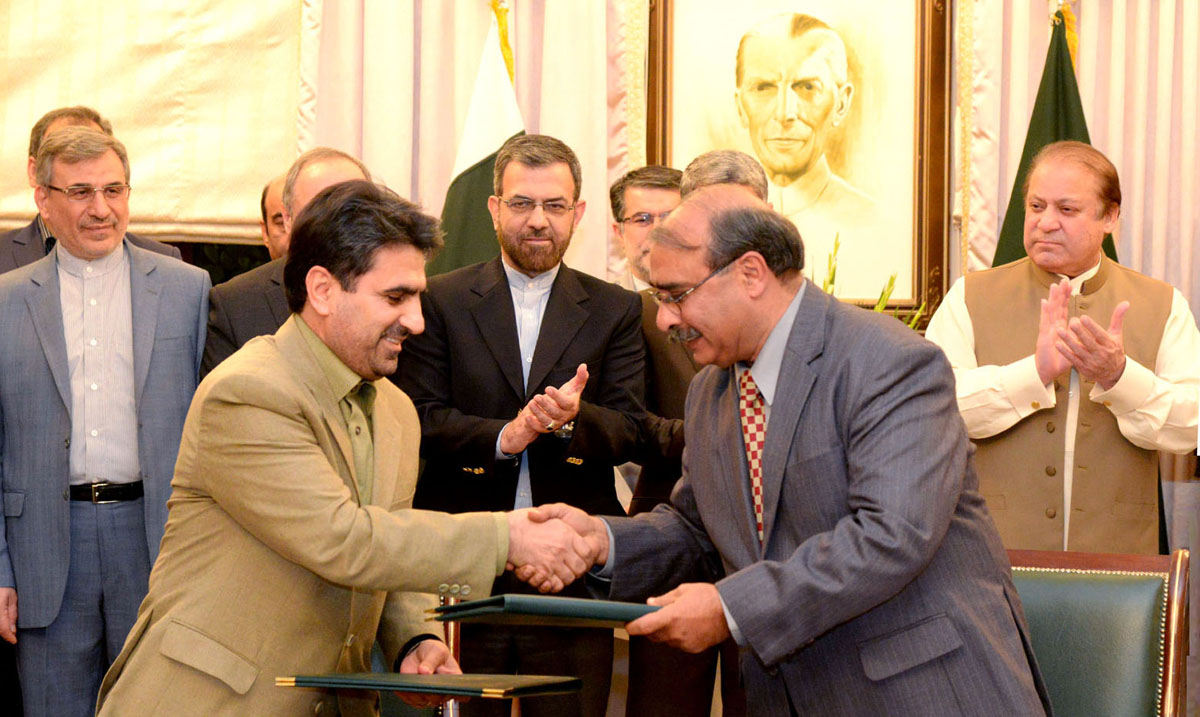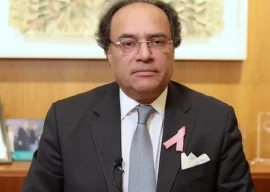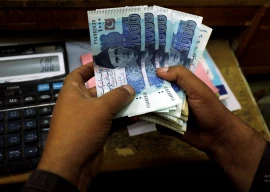
The MoUs related to establishment of Joint Investment Committee, cooperation between SMEDA and Iran's Small Industries, and establishment of sister port relationship between the ports of Karachi and Chabahar in addition to cooperation in the field of investment, economic and technical assistance.
The agreements were signed during a ceremony in Islamabad attended by Prime Minister Nawaz Sharif. He later told the media that relations between Pakistan and Iran are improving, including bilateral cooperation in economy, culture, science and technology.
The premier identified that there are vast opportunities of increasing the volume of trade between the two neighbouring countries.
Earlier, Iran’s Minister for Economic Affairs and Finance Dr Ali Tayyebnia called on the prime minster in Islamabad.
Iranian Minister is in Islamabad to attend the 19th session of the Pakistan-Iran Joint Economic Commission.
The premier expressed hope that the JEC session would open new areas of cooperation while fortifying the existing initiatives. During the meeting both sides agreed upon increasing mutual investment and bilateral trade between the two countries.
Pakistan for expanding Preferential Trade Agreement with Iran
Federal Minister for Commerce Khurram Dastgir told the Iranian finance minister that Pakistan wished to make the current Preferential Trade agreement with Iran effectively operational and expand it by including more items of trade in the reduced tariff list. This despite the fact that international sanctions have hampered trade ties with Iran.
Emphasising on engaging in a constructive dialogue to develop trade relations between the two countries on mutually beneficial terms, the Dastgir said that Pakistan wants to enhance the limited trade base between the two countries, which currently stands at $217 million.
Trade between Pakistan and Iran currently comprises mainly oil and gas from Iran and rice from Pakistan. Dastgir said Pakistan wants to enhance the trade base to include meat, fruits, textile, surgical items, sports goods, gems and jewelry in addition to rice as regular items of trade.
The minister was of the opinion that owing to sanctions, the two countries can initially use barter as preferential mode of trading until a suitable and recognised mechanism of payment is chalked out.
During the meeting, the Iranian side proposed the establishment of border markets to facilitate the trade among local communities residing in the border provinces of the two countries, adding that initially four such markets can be set up which may be increased depending upon their efficacy in the first phase.
Tayyebnia also proposed a plan to develop Joint Economic Zones which would have the necessary facilities to attract investment. Dastgir proposed a Gawadar-Chahbahar Joint Economic Zone which would have the potential to grow immensely.
Pakistan urged Iran to initiate dialogue among relevant authorities to develop mutually recognised standards and specifications which would be accepted across the two countries.
Both sides agreed to develop better data exchange systems between them to improve coordination between the two sides.
They also agreed to develop additional border posts to facilitate trade and movement of visitors across the border. Currently, there is only one crossing point at Taftan.
COMMENTS (4)
Comments are moderated and generally will be posted if they are on-topic and not abusive.
For more information, please see our Comments FAQ


1729080111-0/BeFunky-collage-(63)1729080111-0-165x106.webp)
1730838202-0/Trump-(1)1730838202-0-165x106.webp)













Now the time has come to stand on your own feet and say good bye to US for real and uninterrupted sovereignty.....
All these energy signing in December is only intended, not to pay penality to iran for not completing the gas pipeline from pakistani side of the border.
It is good to learn that Pakistan and Iran have signed five MOUs relating to establishment of Joint Investment Committee, cooperation between SMEDA and Iran’s Small Industries, and establishment of sister port relationship between the ports of Karachi and Chabahar in addition to cooperation in the field of investment, economic and technical assistance. While MOUs on their own do not mean much and sometimes these are signed just as a routine operation during foreign tours of high officials, only to create an impression that some meaningful achievement was made during the visit, and are forgotten soon after. However, it is hoped that these MOUs actually lead to increased cooperation between two neighbours who had excellent relations a few decades back, which was only natural, and was in the interest of both countries.
I remember Shah of Iran was the first foreign head of state to visit Pakistan. And when Pakistan needed fighter aircraft for its air force, Shah of Iran diverted the consignment already on order thus saving Pakistan precious time, opting to wait himself instead for months or even years which elapse between order and delivery. The cultural relations go back centuries and up to my father's generation, all educated persons were supposed to be, and actually were proficient in Persian as well. And Iranian cafes were a dominant part of the Karachi scene.
I hope the signing of these MOUs proves to be a beginning of a process leading to the same old-level excellent relations between the two countries. Elsewhere, I have read that the Iranian government has waived the $ 3 million a day penalty for not completing its side of the Iran-Pakistan pipeline by First January, and has extended the time limit, which is a very kind gesture indeed.
Surprisingly, the unfortunate sectarian problem was not discussed, maybe because it was not the right forum and/or a forum already exists to look after that problem. There is a real need to take anti-sectarian activity to a high level and to develop a strong will to deal with this menace which also has international connections, forming part of an ongoing Shia-Sunni war launched by some Middle Eastern rulers who are doing a great harm to the Ummah through their imprudent acts which, in due course, are also likely to ruin them. Obviously, if you put your neighbour's house on fire, he flames will engulf you as well. With plenty of militant and terrorist activity going on in the country already, there is simply no reason to add to it and allow other states make Pakistan a battle-field for their proxy wars. Gen. Raheel Sharif has done excellent work by eliminating terrorists havens in Waziristan and hopefully, he will deal firmly with this sectarian menace as well. Unfortunately, our timid, greedy and selfish rulers who are fully-occupied trying to multiply their foreign wealth have neither time, nor the interest, and not even the courage to deal with this matter, and this menace also will have to be tackled by armed forces of Pakistan.
Karachi
Our leadership talks loudly of sanction on Iran only for gas pipeline where as India,Japan, China and others doing energy business,USA realizing frozen funds,our leadership can't get wavier for seriously energy starved country.Actually own leadership has anti-Iran mind set injected by KSA/USA ie also true for Afghanistan,India,Russia and China.